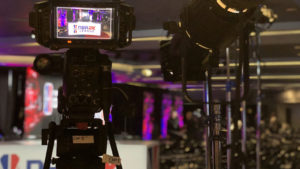The success of any event is important to the reputation and credibility of your company. It doesn’t matter how great your ideas are if you present them poorly. For this reason, we should be concerned with both the big and small things so that all will run smoothly for your next event production whether it’s an IRL event or a hybrid event.
Ensure that you don’t forget anything when planning your next event production:
1. Don’t lose perspective.
It is easy to get carried away by the logistics of your event production. It’s important to remember that crafting a memorable experience for your attendees is the final goal. Your attendees are not machines. They are people. Your event must meet the needs of your guests, not vice versa. Keep the momentum going, your event begins long before the first guest arrives. From developing the theme of the event to engaging your audience; everything should lead to your final product. You must be consistent in your efforts. Keep things simple and keep moving forward. Don’t lose sight of your main goal. This is not about you. Yes, it is your company’s latest product or initiative, but we must always remember that planning an event production is about your audience. Your attendees must remember why they came in the first place.
2. Do research on all aspects of the event.
It is extremely important that you do your research when producing an event. This means that you should fully understand your audience; their demographic, their purchasing habits, and their preferences. Your event production can have all the bells and whistles and fantastic engagement strategies but it’ll be all for nothing if you don’t fully know your audience. Your target audience would also have a big impact on the appropriate facilities that you will need for your event. Knowing the numbers and demographics of your audience will also help you generate the appropriate budget needed for event promotion, venue, meal, refreshments, etc.
3. Don’t wait too long to book the venue for in-person or hybrid event.
As soon as you have secured the venue you can begin doing site visits and pre-production work to orchestrate all of the activities that will be necessary to stage your event. These early conversations will go a long way to plan and execute all aspects of the production from scenic, activations, audience flow, and inform how to develop the run of show. Keep your options open and know what’s going to happen, including possible contingencies should something go wrong.
4. Don’t forget about the small details.
It’s easy to overlook small, but important details when planning your event. However, these small details can really make an impact on your event production and your attendees’ experience. For example, choosing the wrong font on a name tag or table tent, having a bad lighting can ruin your scenic design or incorrectly listing out the menu on your badges, can all cause your attendees to have an unpleasant experience. It’s always good to double-check your work. Remember, the majority of the details are going to come from your team. Take time to organize your materials. The way you present information will have an impact and is a reflection of your organization’s brand. The presentation is a reflection of you and your company; it should showcase your professionalism. Keep things consistent and take the time to give details some thought.
5. Keep things fairly standard.
If you’re planning a large event, it can be difficult to keep things consistent. However, it is vital to the success of your event. Your promotions should be consistent across every marketing channel. Your support materials should be updated for every event. Keeping things coherent will give your event a professional appearance. It will also allow you to train new employees easily to ensure the experiences and events that your team produces are consistent from one to another.
6. Don’t forget to delegate.
Many event planners are planners, planners, planners. It is important to be organized and meticulous when planning an event. However, this does not mean that you should do everything yourself. Trying to do everything yourself can end up being counterproductive. It can cause a lot of stress and take up a lot of time. Remember to delegate responsibilities to people on your team who are willing and capable. Remember, the goal is to make your event memorable, it is important to remember that event production is about the experience. Hiring a professional event production company may not be such a bad idea – it’ll save you time and (if you choose the right partner) possibly money to have someone take care of all the logistics of the event so you can focus your energy more on how to effectively engage your audience or create a memorable experience. It’s better to work smart than to work hard.
7. Don’t overdo it.
Planning an event can be a lot of work and there is always that possibility to overdo some aspects of the event. For example, sometimes there are too many activations at an IRL or it can be in the form of having too much gamification on a virtual event. The fact of the matter is you want to remember that often “simplicity is the ultimate sophistication.
8. Don’t forget to promote your event.
Last but definitely not least, don’t forget to promote your event. Marketing your event is crucial. You want your event to be a success for all those involved. Remember, your event doesn’t begin when everyone walks through the door. It starts the moment that you begin to promote. You have to think about what you want to achieve and what your goals are. Once you have your goals, you can begin your marketing efforts. You should plan your marketing strategy well ahead of time. Furthermore, if you want to promote your event on social media, you should begin posting about it weeks, if not months, in advance. Planning ahead will ensure that your marketing efforts are effective. Make sure that your employees are on board. Your employees are your biggest advocates. Encourage your employees to share any promotions with their personal and professional contacts. You can also incentivize your employees for referrals or for a certain amount of sales. When you create hype, you increase anticipation. Promoting your event beforehand will allow your attendees to be ready and bring a guest with them. You should consider planning an incentive to encourage your attendees to bring a guest. You can also create social media contests and giveaways to generate buzz before the event.
9. Remember, the little details are important but aren’t as important as relationships.
Establishing positive relationships with your attendees, your team, sponsors, and suppliers is vital to the success of your event. Yes, planning an event production takes a lot of effort. There can be many details that need to be checked, but ultimately, the success of your event comes down to the people. Without the attendees, there would be no need for an event. Without your team, there would be no way to host a successful event. Without your sponsor and suppliers, there would be no event. Your attendees, your team, your sponsors and your suppliers are the people. Your event is about people. It is primarily for the people, by the people.
10. Don’t forget to have fun.
When you’re planning an event, it’s easy for that feeling of pressure to push its way into your thoughts. As you’re planning your event, remember the reason you’re doing it in the first place. You’re planning this event to make an impact. You want to provide your attendees with a great experience. You want to create memorable experiences for those in attendance. Your attendees are coming to have an experience – so keep that in focus. Yes, event production can be a lot of work, but it can also be a lot of fun. Planning an event is exciting and can have a tremendous impact on your business and the industry.



